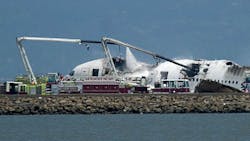Crash Mars Asiana's Image After Years of Efforts: Experts
SEOUL - South Korea's number No. 2 airline Asiana has spent years trying to build a reputation for safety and quality but the San Francisco crash could tarnish its image, business analysts said Monday as the carrier's share price dived.
But aviation experts said the damage to its business would probably be limited, even though suspicion is focusing on pilot error as the cause of Saturday's accident.
South Korea's two major carriers - Asiana and flag carrier Korean Air - made strenuous efforts to improve safety, bringing in overseas experts, after what one expert called a "terrible period" in the later decades of the 20th century.
The crash, which killed two teenage Chinese passengers and injured 182 other people when the plane touched down short of the runway, was Asiana's first fatal passenger jet crash since 1993. Korean Air's last deadly passenger jet crash was in 1997.
Asiana's share price tumbled Monday, losing 5.76% to 4,825 won (US $4.20) as investors digested the impact of the accident.
"You can't rule out the possibility that such a fatal accident that hurts the firm's reputation will sap demand for Asiana's services down the road," HMC Investment Securities analyst Kang Dong-Jin said.
Potentially huge insurance payouts to victims and for the aircraft will raise future premiums and increase financial burdens, he added.
"Although the cause of the accident has not been revealed yet, the firm's first major accident in 20 years will inevitably cause damage to its business both in the short and long term," said KDB Daewoo Securities analyst Jay Ryu.
Plane Traveling Slow for Landing
U.S. investigators said the Boeing 777 was travelling much slower than recommended on final approach, and a pilot asked to abort the landing moments before the plane's tail smashed into the ground.
The flight data recorder also showed that as the 777 approached the runway its pilots were warned that the aircraft was likely to stall, said U.S. National Transportation Safety Board chairwoman Deborah Hersman.
The request to abort the landing was captured on the cockpit voice recorder 1.5 seconds before the crash, Hersman said.
Asiana said the troubled plane was controlled all the way through to landing by a pilot who was undergoing training on a 777.
Lee Kang-Kuk, 46, had only 43 hours of experience in handling this type of aircraft but is a skilled pilot with more than 9,000 flying hours, it said.
And Lee was accompanied by an experienced co-pilot, it added.
South Korea's transport ministry said it could take months to identify the cause of the accident, even though an initial inspection showed the tail struck a sea wall at the end of the runway.
While Korean carriers had a "terrible period" of accidents in previous decades, "in the past 10 years their record has been pretty good," said Tom Ballantyne, chief correspondent of Orient Aviation magazine.
The fact that an Asiana pilot under training for 777 aircraft was landing the plane was "very normal," he said.
Effort to Abort Landing Was Too Late
Combined, the pilots had "thousands of hours' experience in the cockpit."
Ballantyne said it was "pretty certain" from the debris field that the plane's tail hit the sea wall and that the evidence pointed to "misjudgment by the person operating the aircraft."
"By the time they decided to go around (abort), it was far too late."
But Ballantyne said the Asiana cabin crew should take credit for the speedy evacuation of the plane - a point made by passengers, including one who praised a flight attendant as a "hero" for helping survivors escape as smoke billowed through the cabin.
Ballantyne also forecast no long-lasting damage to the airline's reputation. "People would be surprised at how quickly airlines recover from incidents like this if they handle it correctly and are open and honest."
Jonathan Galaviz, managing director of Galaviz & Company - a U.S.-based consultancy that focuses on Asia including the leisure and travel industry - also said the effect on Asiana would be limited.
"The impact of the crash on the long-term growth of airlines based out of Asia will be negligible," Galaviz said in emailed comments.
"All things considered, most large airlines in Asia have great safety records and have great pilots who are very experienced in international environments."
Jung Hawon, AFP
Copyright Agence France-Presse, 2013
About the Author
Agence France-Presse
Copyright Agence France-Presse, 2002-2025. AFP text, photos, graphics and logos shall not be reproduced, published, broadcast, rewritten for broadcast or publication or redistributed directly or indirectly in any medium. AFP shall not be held liable for any delays, inaccuracies, errors or omissions in any AFP content, or for any actions taken in consequence.
